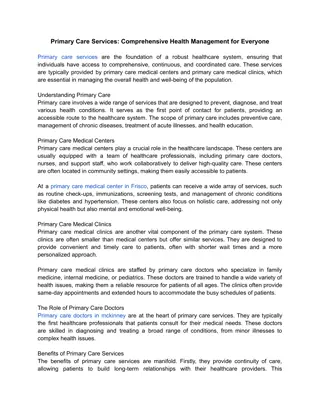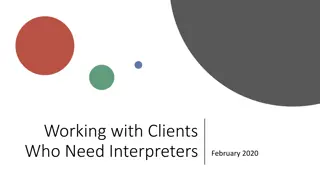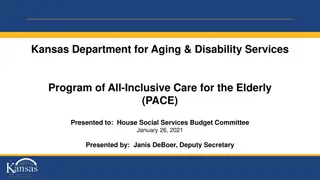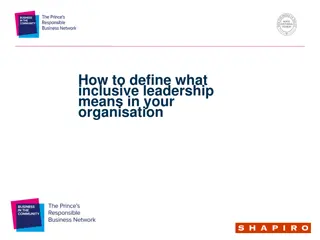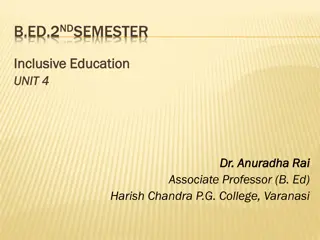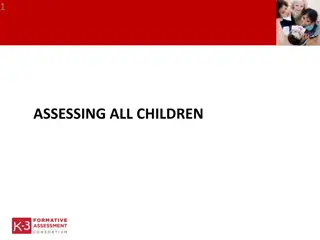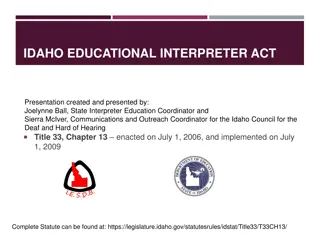Inclusive Care Practices for Medical Interpreters
Seattle Children's has implemented a new process to collect chosen names and pronouns for all new patients, emphasizing the importance of respecting patients' identities. Gender-inclusive language guidelines are provided to ensure safe and supportive care, highlighting the impacts of misgendering. Best practices for interpreters include using patients' chosen names and pronouns consistently and respectfully asking for their preferred pronouns. Adhering to these practices helps create a welcoming and inclusive healthcare environment.
Download Presentation

Please find below an Image/Link to download the presentation.
The content on the website is provided AS IS for your information and personal use only. It may not be sold, licensed, or shared on other websites without obtaining consent from the author.If you encounter any issues during the download, it is possible that the publisher has removed the file from their server.
You are allowed to download the files provided on this website for personal or commercial use, subject to the condition that they are used lawfully. All files are the property of their respective owners.
The content on the website is provided AS IS for your information and personal use only. It may not be sold, licensed, or shared on other websites without obtaining consent from the author.
E N D
Presentation Transcript
Chosen Names and Personal Pronouns: What Interpreters Need to Know April 2022
Chosen Name and Personal Pronouns: New Process at Seattle Children s What s new? Seattle Children s is excited to announce chosen names and personal pronouns are now being collected for all new patients. Our care teams are expected to look for names and pronouns in the electronic medical record and use them in every interaction. As an agency interpreter we want to make you aware of this new process and give you the tools you need to follow our new standard of care. Why is using patient s pronouns important? Statistics show using a patient s chosen name and personal pronouns are a critical component to helping them feel known, seen and even reducing instances of depression and suicidal thoughts.
Gender, Sex and Identity Definitions Legal name: name on ID like birth certificate Chosen name: the name a patient goes by Pronouns: how patient is referred to (for example: he, she, they) Legal sex: the sex listed on ID especially insurance Sex assigned at birth: the sex listed on original birth certificate Gender identity: the gender a patient identifies with
Gender Inclusive Language Situation What to Do What Not to Do Do not assume their gender. Do not ask about genitals. Do not refer to the patient as it . When unsure of patient s gender Use patient s preferred name. Does Matthew have any medical allergies? Do not refer to the patient as it Do not use the patient s legal name if aware of preferred/affirmed name. When talking about a patient Avoid using gender specific pronouns. Example Your patient is waiting for you .
Impacts to Safe and Supportive Care What happens when we don t respect gender language? Safety issues A patient who is assigned female at birth and has a male legal sex and gender identity may not receive a necessary pregnancy test before surgery. Scheduling barriers A patient who is assigned female at birth and has a male legal sex and gender identity may be refused a needed appointment in gynecology. Revenue cycle and insurance issues A patient whose gender identity doesn t match their legal may have their insurance claims denied, resulting in family receiving a bill for the full cost of care.
Best Practices for Interpreters Start with introductions. Introduce everyone in the room, including the interpreter. Use the name the patient chooses, even if it is different than their legal name. Don t assume a patient s pronouns based on their name, voice, or other information. It s better to respectfully ask What pronouns do you use? For example, he/him, she/her, or they/them? Be consistent. Once a patient s pronouns have been confirmed, use them consistently throughout the appointment. Practice! Look for ways to use gender inclusive language. For example, try saying Hello, everyone! instead of Hi, guys!
Professional Code of Conduct Interpreters must: Relay information accurately and conserve the tone and spirit of the source language Be culturally sensitive and respectful to the people served Maintain confidentiality and keep all information obtained in session private. Always be impartial and unbiased. Never discriminate based on gender, disability, race, color, national origin, age, socio-economic or educational or marital status, religious or political beliefs, or sexual orientation.
Additional Resources Seattle Children s Gender Clinic Website https://www.seattlechildrens.org/clinics/gender-clinic/ PFLAG Glossary of Terms for LGBTQ identities https://www.pflag.org/glossary A research-based infographic about the importance of family support for trans youth http://www.transstudent.org/youthsupport





